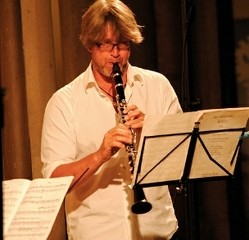|
Back
New Sounds from Old Composers New York
SubCulture
09/13/2014 -
Wolfgang Amadeus Mozart: Allegro for Strings and Clarinet in B-flat Major, KV Anhang 91 – Concerto for Piano No. 12 in A Major, K. 414
Felix Mendelssohn: Concerto for Piano and Violin with strings, in D Minor
Hein Wiedijk (Clarinet), Weiyin Chen (Piano)
Camerata RCO (Royal Concertgebouw Orchestra): Marc Daniel van Biemen, Annabeth Webb, Joanna Westers (Violins), Jeroen Woudstra (Viola), Godfried Hoogeveen (Cello), Rob Dirksen (Double-bass)

W. Chen (© Courtesy of the Artist)
Mozart and Mendelssohn are hardly the most exotic names for a concert. But the three works played at SubCulture last night were anything but ordinary. In fact, for nearly everybody in the full house, this trio had never been heard before.
And were well worth hearing.
First, because the Camerata of the Royal Concertgebouw Orchestra were worthy of their names, six string players, one solo violinist, one solo clarinetist, all playing with precision, energy and, above all, a feeling that their ensemble had been put together for this concert, and they were taking the greatest joy in working with each other.
But the star of the evening was undoubtedly Weiyin Chen, a pianist whose first album was given the most ecstatic raves by Fanfare Magazine (her Schubert being compared favorably to Alfred Brendel), and whose tutors included musical royalty.
In fact, going home I was thinking that poor Alexander the Great had only a single tutor who was the finest in the world–Aristotle. But the Taiwanese-American Ms. Chen had a pair of teachers from the halcyon of 20th Century pianism, Leon Fleisher (who will conduct Ms Chen in Taiwan) and Richard Goode (who was in the audience last night). With that duo, as well as other teachers, Ms. Chen obviously had manifold virtues from which to choose.
Frankly, though, the choices of music were not the best for exhibiting Ms. Chen’s singular appeal. The Mozart Twelfth Concerto was played in the composer’s arrangement for piano and strings , so it was missing a certain depth. Mendelssohn’s Violin-Piano Concerto, an absolutely delicious, delightful composition, written when the composer was 13 years old, was more than a novelty. It had moments of pure delicious playing. But profundity was not its hallmark.
Still, this Mozart gave an indication of Ms. Chen’s terrific finger-work in the pair of cadenzas, written by the composer himself. They are fiercely difficult, and Ms. Chen took them with an easy and apparent effortlessness.
I was not enamored of Mozart’s chamber arrangement here. So elegiac is this orchestration, without brass or drums but with the serenity of oboes, bassoons and horns, that one misses the contrast with the soloist. Mozart of course always made the best effect expressible by opposed masses of solo and ensemble, and here, we had a virtual piano quintet.
SubCulture itself may be a terrific atmosphere for bands, for resonance, for emotional music of all kinds. But the so Mozartean classical themes here came out sharp, acute, almost vying with the violins. All except that second movement, a true lament, written for Johann Christian Bach, Mozart’s teacher, was beautifully played. This was basically a solo, and one could understand why Ms. Chen has been so well praised for her Schubert.
The Mendelssohn, which had been unknown until 60 years ago, was, for this listener, the absolute most memorable work. Part is because it was totally new. One can become a bit blasé when hearing the same Mendelssohn over and over again. But listening to this unusual work–especially with the dominant solo violin by Marc Daniel van Biemen–was a journey of the most delightful discovery.
This was written originally for string orchestra, but the five string soloists kept in the background for Mr. van Biemen’s work. Yet the composer gave both soloists so much to do, that Ms. Chen and Mr. Van Biemen ran their musical race like two partners working their marathon for fun.
After the somewhat pallid background for the Mozart, the fierce combination of violin and piano in the opening movement was like a shot of fire. The second movement could have been a duet by Bellini, and the final Allegro molto was one of the only ventures I know of Mendelssohn in a frisky Gypsy mood.

H. Wiedijk (© Courtesy of the Artist)
The third soloist of the evening, Camerata clarinetist Hein Wiedijk, played a work which was only part Mozart. Apparently, this was produced as an alternative movement for the Clarinet Quintet, but Mozart only finished the exposition. That, though, had a few measures which were entrancing, as clarinet, with first violin, went up and down the scale, just one note behind each other, for a unique rippling effect.
The piece was short, fun and played with Royal Concertgebouw finesse.
The evening, though, belonged to Weiyin Chen, who will be making two more appearances at SubCulture this season, one with all Brahms (and the Miró Quartet), the other with a work written for her by Marc Neiborg. Both should be worth the price of admission.
Harry Rolnick
|